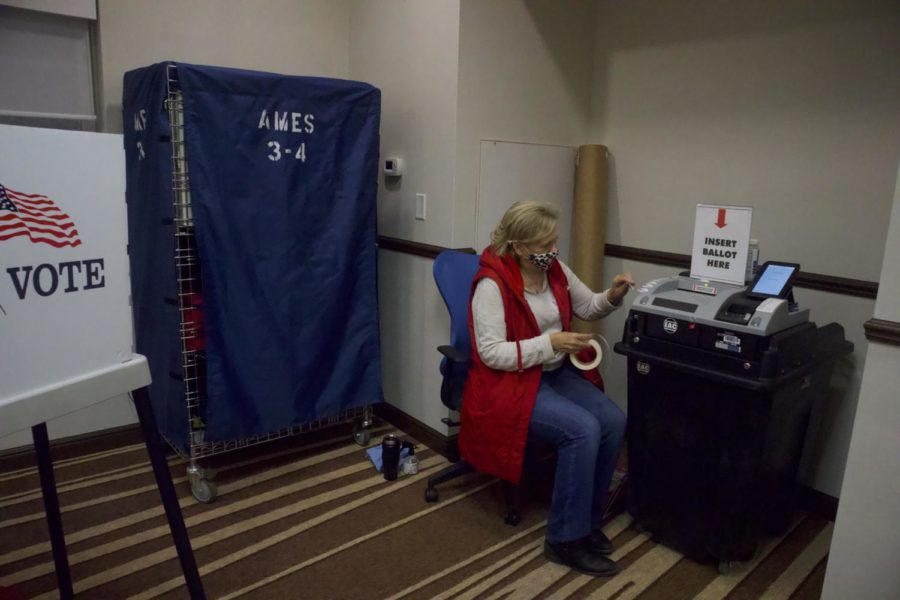Letter from the editor: The most important elections are local races
The polling location at the Hilton Garden Inn, volunteers work the various areas to ensure smooth voting in the Nov. 2 election
Political campaigns will tell you this is the most important midterm, hoping you will pause your busy day filled with work, classes or both to go vote. Aside from this message being on repeat on ads and social media, I can’t help but feel a sense of déjà vu.
Campaigns in the 2018 election pressured voters with the same message, and my highest bets are on this narrative repeating in 2024. What should be advertised is researching and voting in races down the ballot because those are the races that impact voters more directly.
While this threat of a doomsday election attempts to resurrect constituents, it inadvertently results in down-ballot dropoff. Karen Kedrowski, a professor of political science and the director of the Carrie Chapman Catt Center for Women in Politics, said down-ballot dropoff is when voters only mark candidates at the top of the ticket, such as president, congressional or gubernatorial candidate, often dropping off on local elections and ballot issues.
Another victim of the ballot drop-off is constitutional amendments featured on the back of a ballot, requiring voters to turn it over. This midterm election, Iowans can vote to amend the state constitution to include the right to bear arms. Alleged violations of this right would have to meet the highest level of legal scrutiny to receive damages.
In a recent speech from President Joe Biden, he claimed this election is “one of the most important elections in our lifetime” to maintain control of the U.S. House and Senate. This blanket statement detracts from local elections by placing partisanship as the motivator.
That is not to say there aren’t issues uniquely consequential to this election.
Our political rhetoric should promote voters going to the polls with a comprehensive understanding of local debates within each race, not a concern of which party remains in power.
“Local governments are really important and touch us frequently in our day-to-day lives much more frequently than the national government does,” Kedrowski said.
But this over-stated call to action does not answer why a nation that prides itself on promoting democratic practices needs talking heads and campaign ads presenting extreme ultimatums to corner American voters into a voting booth.
Federal candidates from both parties skim over significant and complex matters, turning them into bait through obscure promises like combating inflation or making college free in hopes of snagging a voter.
Unlike at the federal or state level, low-informational elections tend to take place at local levels of government.
“In these races, there are not the people who are buying ads on television or our favorite social media platform,” Kedrowski said. “Many of them [local elections] are uncontested, which further contributes to them flying under the radar. So because people don’t know anything about them [the candidate] or the position, that is another reason people will just skip it.”
Voters need to look past both parties’ attempts to create straight-ticket voters. Instead of only voting for the races that seem most important due to media attraction, voters need to base their candidate preference on the most relevant issues within each race.
“A lot of people tend to discount local elections as not being important,” Kedrowski said. “What I would say is that in our federal system, local elections are supremely important because we interact with the federal government fairly abstractly.”
Voters need to reassess the importance of understanding and being involved in local government. Ballots with unmarked races are still counted, but that is still a vote wasted.
Because both parties benefit from this shallow form of politics and ballot dropoff, it is up to voters to change their approach to selecting candidates and how they research races.
Polls open Nov. 8 from 7 a.m. to 8 p.m. Stay in line!
Resources:
Candidate list for Story County
Carrie Chapman Catt Center offers voting FAQs
Iowa Secretary of State – links for voter registration, restoring voting rights, voter ID information, etc.
Your donation will support the student journalists of the Iowa State Daily. Your contribution will allow us to purchase equipment, send our student journalists to conferences and off-set their cost of living so they can continue to do best-in-the-nation work at the Iowa State Daily.












